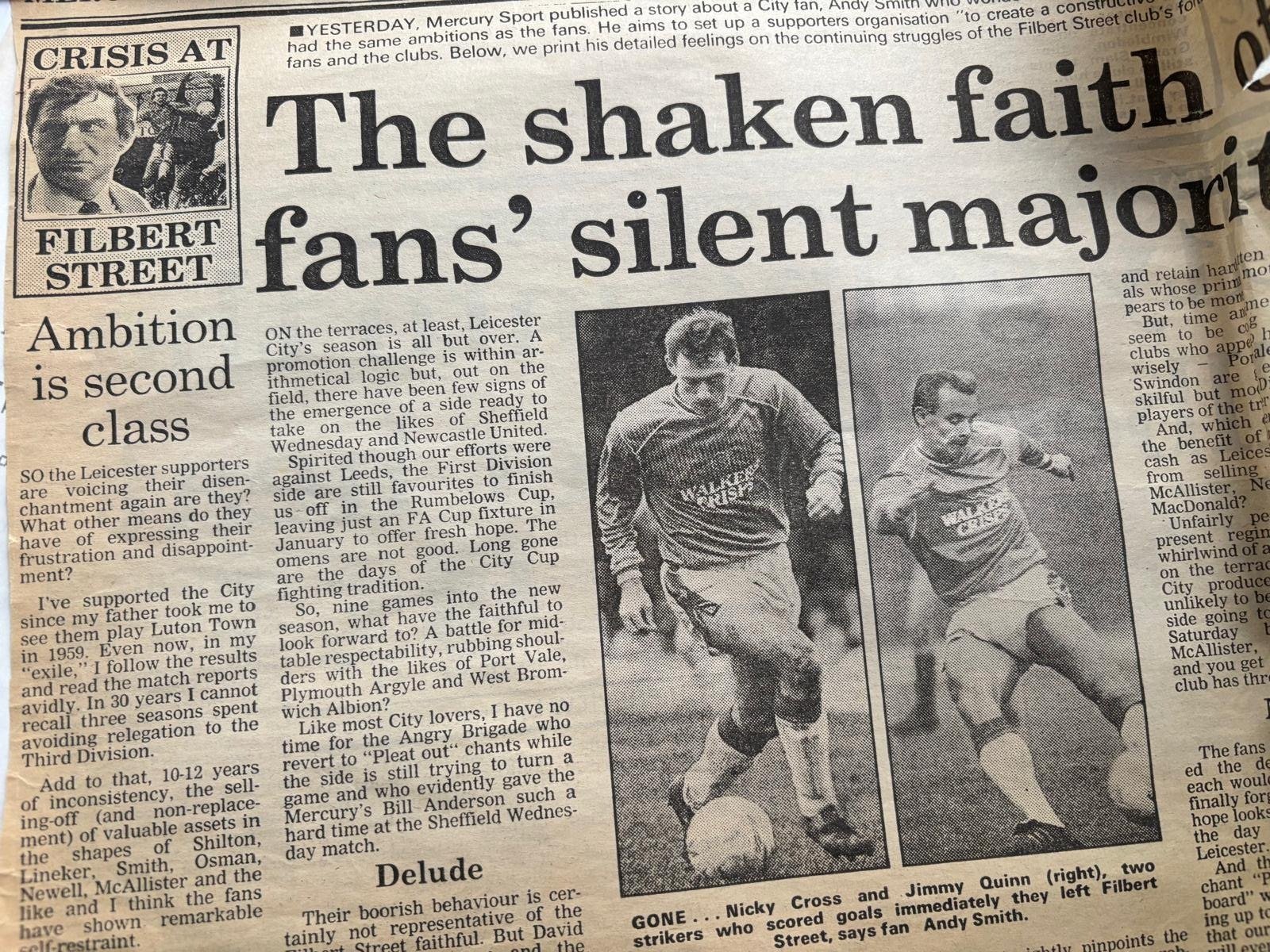And so to the barricades: Recalling a past campaign for change at Leicester City
With protest in the air, Andrew Smith recalls starting a supporter campaign for change at the top of the football club, 35 years ago. By accident.
September 29 1990. Division Two. Middlesbrough 6 Leicester City 0. The seventh of seven defeats in a row. Among the teams to overpower us: Port Vale; Plymouth Argyle; Oldham Athletic. And now humiliation on Teesside.
Our “yo-yo club” reputation was at risk after three seasons stuck in the second tier. Managers Bryan Hamilton and David Pleat were unable to stem the stench of decline since the 1987 relegation.
There was talk of a lucrative league reorganisation. And Leicester were nowhere near being on the runaway train that was to be the Premier League.
There were decent players: Steve Walsh; Ali Mauchlen; David Kelly. But Gary McAllister had been sold and replaced with the hapless Ricky Hill. The squad teemed with mediocrity.
The club was in danger of being relegated to an historic new low. And I’d had enough.
So I composed a letter to the Leicester Mercury, outlining the growing fan frustration at the lack of ambition and competence at the top of the club. It was very much longer than I thought they’d ever print. Yet when I opened my copy of the paper, it was all there.
Pravda takes a holiday
The Mercury’s long-standing Leicester City correspondent at the time was an arrogant Scot called Bill Anderson. He had no time for supporter complaints about the club and made no attempt to hide his contempt.
Fans were both ungrateful and ignorant. Their role was to cheer the boys on, no matter how bad things became.
Match reports were notoriously one-eyed. Driving back from the game, I’d pick up the Sports Buff from the newsagent in Ashby de-la-Zouch and read in disbelief.
Harmless City shots into the crowd apparently “went close.” Brief periods of City possession were “domination” and heavy defeats always carried the promise of improvement “next week.”
Players clearly of an unexceptional standard were interviewed as if their signing or return from injury would be transformative for the team’s fortunes.
I’ll never know how significant it was, but when my detailed critique of the flaws besetting Leicester City Football Club arrived at the Mercury back in October 1990, Bill was on holiday.
So it was another sports correspondent from the Mercury who rang me: “The switchboard is swamped with callers who agree with your letter,” he said. “They want to do something about the state of the club. Can you give us a contact number?”
He also said they could write a news story saying I was interested in setting up a supporter group to pressure the club for change. I agreed.
When I got home, my answerphone (remember those?) had run out of space for messages. Men, women, children: all wanted to join my non-existent campaign.
What do we want?
The thrust of our complaint was that, under the Shipman family, the club had too timidly accepted a subservient role in the footballing hierarchy. Promising talent was sold at pretty much the first opportunity with barely a thought for building a successful team at Filbert Street.
The season that typified this approach and led to general despair in the fanbase was the season of 1984-5. A Division One front line of Gary Lineker (24), Alan Smith (12) and Steve Lynex (13) produced 49 league goals between them.
Yet the team finished a miserable 15th while scoring more goals than Southampton in fifth, Chelsea in sixth and Arsenal in seventh. A decent defence and who knows what might have happened? But that was never on the cards.
The following season Lineker was sold. Smith stayed for two more seasons before joining Arsenal.
By the early nineties Gary McAllister had been and gone as well, and the club had run out of assets to sell. Cue cheap and largely ineffective loan signings.
There were clubs of a similar size who were competitive in the top division. Crystal Palace were to finish third in that 1990-1991 season, while QPR, Sheffield United, Southampton and Norwich were comfortably mid-table.
I felt our lack of ambition particularly acutely. Brought up in south Derbyshire, I spent my life being harangued by Derby and Forest fans as Brian Clough took their clubs to unprecedented heights.
We wanted Leicester City to be equally ambitious.
Ambitious Leicester Fans (ALF)
Hundreds of Leicester fans from all over the country contacted me. We hastily convened a public meeting – if memory serves me right, around 300 people attended.
We wanted a memorable acronym and a snappy name which all fans could get behind. Ambitious Leicester Fans was our choice.
Even so, there were disagreements about the level of militancy we should adopt. Some wanted match boycotts, protests during matches, demos at people’s houses.
Others were more cautious. Not wanting to affect our precarious league position and fearful of turning on well-meaning owners. I remember fellow fans taking our carefully worded leaflets and ripping them up in front of our noses. Their idea of club loyalty was the polar opposite to ours.
The official supporters’ club would have nothing to do with us. Leicester celebrities who we asked to back us didn’t respond to our letters.
In the weeks that followed we leafletted at matches and asked to meet chairman Terry Shipman. No response. The team continued to slide towards Division Three and eventually David Pleat was sacked. To everyone’s surprise Terry Shipman also stood down. The new chairman was Martin George.
Gordon Lee narrowly kept us in the second Division but also lost his job as George prepared the club for a new era. He agreed to meet representatives of ALF and we left believing the club to be in more caring and ambitious hands.
Under his chairmanship we were to appoint Brian Little, followed by Mark McGhee then most significantly of all, Martin O’Neill.
Our ambitions for Leicester City were about to be realised.




